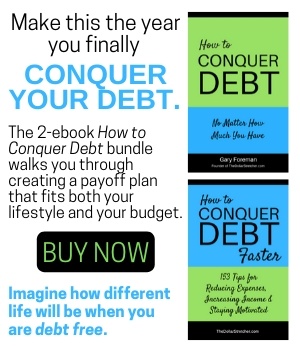10 Ways To Prevent Non-Essential Spending

Shopping might make you feel happier, but unnecessary spending can destroy your budget. Try these tips to prevent non-essential spending and keep your budget intact.
In a world where it is drummed into us to buy things and doing so even makes us happier, non-essential spending can play havoc with our finances.
What is non-essential spending? It is spending money on things that are not vital to one’s existence.
And though you do not want to eliminate all non-essential spending (a frivolous purchase is healthy occasionally), eliminating the bulk of your needless spending, especially during tough financial times, can often save you from financial ruin.
The following tips should help you do this:
1. Figure out what spending habits are essential and/or non-essential in your own particular case and spend accordingly.
Because of income, lifestyle, etc., the spending needs for Individual One may differ greatly from those of Individual Two.
2. List the essential items you plan to purchase each time you shop.
Double-check your list. Are you 100% certain all the items on it are absolutely essential?
I have a one-cup coffee maker, for example. It brews superb coffee; however, it leaks a little around the basket when in use. Does this warrant purchasing a new one? No.
Sign Up for Savings
Subscribe to get money-saving content by email that can help you stretch your dollars further.
Twice each week, you'll receive articles and tips that can help you free up and keep more of your hard-earned money, even on the tightest of budgets.
We respect your privacy. Unsubscribe at any time.
3. Keep track of all your purchases for several weeks.
When I added up my purchases for a one-month period, for example, I found that I had spent more than $100 on items I could have easily done without.
4. Rethink purchasing an item simply because it is on sale.
Even at a greatly reduced price, you would save more by simply not making the purchase at all.
Last Christmas season, I was “oohing and aahing” over some tree ornaments that were on sale, but even at 50% off, they cost $7 each. Telling myself that I would save 100% if I did not purchase them at all, I left the store empty-handed and improvised by using some of my children’s toy plastic spoons and forks, decorative plastic straws, doll clothes, etc. They worked better and made great conversation pieces.
Have you overspent your way into debt?
Make a plan to get back out. Get How to Conquer Your Debt No Matter How Much You Have and create a debt payoff plan personalized to your budget and lifestyle.
5. Find something to do that you are passionate about.
If you are involved in doing something you love, like photography, writing, or art, non-essential purchasing will fall by the wayside. Also, you may discover you barely have time to make essential purchases.
6. Ask yourself if purchasing a particular item will make you happier or more fulfilled.
Well, yes, it can. Temporarily, at least, it can. The thrill of a new purchase soon wears off. When it does, you may feel worse because you spent money you could ill afford to spend.
Let’s say I had purchased the above mentioned tree ornaments. At $7 each, I would have shelled out $70. I become depressed just thinking about it.
Related: The Emotions Behind Buying Stuff
7. Question whether or not you will use the new purchase often enough to warrant buying it.
If you have one or two evening dresses hanging in your closet that are still stylish, still fit, and look marvelous on you and you only attend dressy functions once a year, is it practical to purchase a third?
8. Make staying away from non-essential buying a challenge and even fun.
I make shopping trips fun by seeing how frugal I can be and still purchase those things I need or, in some cases, simply desire.
9. Avoid online shopping.
If you see something online that appeals to you, it is much more likely that you will purchase it since clicking a button or two is so easy. If you do shop online, however, pause before you click and read this article again.
10. Learn to recognize marketing strategies/temptations.
Retailers, especially in today’s weak economy, are pressuring customers to buy with tactics never before thought of. Even technology is trying to get into the act.
For example, although shopping apps are probably one of the coolest and most useful inventions since the light bulb (well, almost), they also make it easier for you to make purchases you would not otherwise consider.
Developing good purchasing habits is essential in today’s precarious financial climate, and cutting out non-essential purchases alone can keep you on the straight-and-narrow path of financial security.
Reviewed November 2023
Sign Up for Savings
Subscribe to get money-saving content by email that can help you stretch your dollars further.
Twice each week, you'll receive articles and tips that can help you free up and keep more of your hard-earned money, even on the tightest of budgets.
We respect your privacy. Unsubscribe at any time.
Wouldn't you like to be a Stretcher too?
Subscribe to get our money-saving content twice per week by email and start living better for less.
We respect your privacy. Unsubscribe at any time.
Popular Articles
- 7 Habits of Highly Frugal People
- 5 Simple Budget Cuts That Can Save $200 a Month
- How to Track Down Unclaimed Funds Owed You
- 32 Ways to Save Money on Your Utility Bills
- Do You Need Credit Life Insurance When Buying a New Car?
- How to Maximize Profits When Selling Online
- Staying Motivated to Continue Digging Yourself Out of Debt
On After50Finances.com
- 9 Things You Need to Do Before You Retire
- You Didn’t Save Enough for Retirement and You’re 55+
- When Empty Nesters Reorganize and Declutter Their Home
- Reinventing Your Career in Your 50s or 60s
- What Mature Homeowners Should Know about Reverse Mortgages
- 2 Reasons to Collect Social Security Benefits As Soon As Possible


